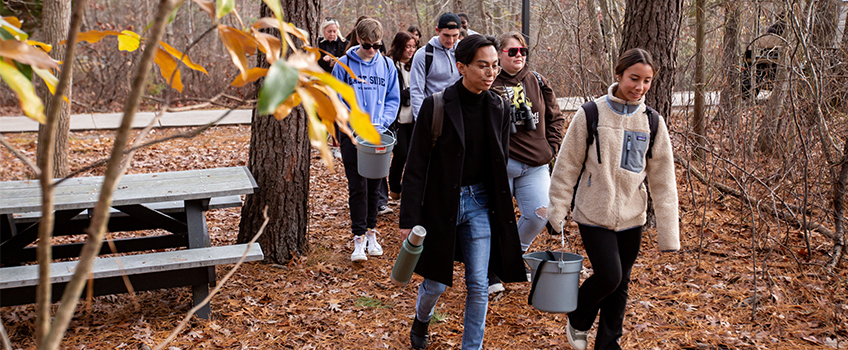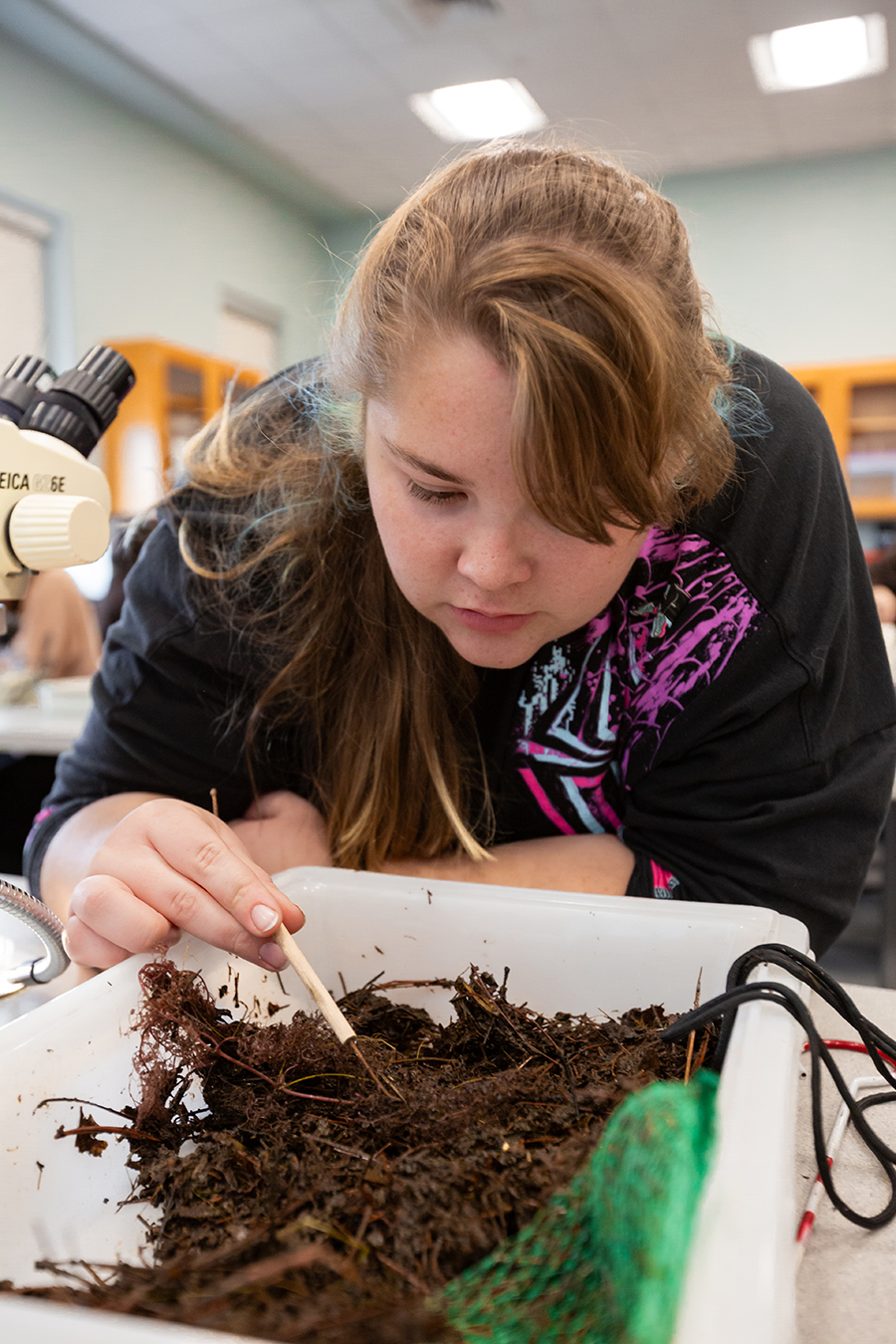Dual-Credit Students Study Lake Fred’s Environment Firsthand

Students from Cedar Creek, Absegami and Oakcrest high schools take a walk around Lake Fred to take samples of leaves and water quality during the first Environmental Science and Dual-Credit Program Outreach Event.
Galloway, N.J. — Savannah Spinelli peered through the microscope to examine the leaf litter sample she pulled from Lake Fred earlier in the day.
Working for years at a Girl Scout camp, the Absegami High School senior loves nature, so she was excited to look for any microorganisms she could find.
“I’ve come to Stockton before, but this is a little bit different. This is right up my alley,” the Galloway Township native said. “I should have brought my rain boots, honestly, because I would have been in that water immediately. I’m not afraid to get dirty and get wet. I’ll just go into the water anywhere.”

Absegami High School senior Savannah Spinelli examines some of the leaf little sample she collected around Lake Fred. Spinelli has committed to Stockton and plans to major in a science program.
Spinelli was one of about 40 students from Absegami, Cedar Creek and Oakcrest high schools who visited Stockton University on Dec. 5 for the first Environmental Science and Dual-Credit Program Outreach Event.
The event was created by Shawn Manuola, the administrator of Stockton’s high school dual-credit program, and Jessica Hallagan, an associate professor of Environmental Science, to give high school juniors and seniors an opportunity to visit classrooms on campus, meet faculty and ask questions about the different parts of the environmental sciences, such as wildlife ecology, hydrology, water quality and soil science.
Stockton’s dual-credit program offers high school students a chance to get a jump start on college and save money by earning college credits and completing high school course requirements simultaneously. Students participating get a reduced tuition rate of $100 per credit or $400 for each four-credit course, with all additional fees waived. In comparison, a four-credit course at Stockton normally costs $2,450. The university offers nearly 100 different dual-credit courses, including an “Intro to Environmental Studies” class, and partners with high schools in New Jersey, Pennsylvania and Delaware.
“The itinerary is going to really show the students what a day in the life is for a Stockton student,” Manuola said. “It’s a great opportunity and we are really encouraging the students to ask questions.”
After an introduction to some of the faculty members, the students separated into two groups — one to examine the soil around Lake Fred, while the other took water readings and recovered leaf litter samples to be examined later in a classroom.
“We thought it would be really neat to bring them here to see the field experiences that we give our students,” said Hallagan, who led the soil examinations with the students. “These kids, they want to be outside. This is what the students have the most fun with — the hands-on stuff, the what-are-you-going-to-be-doing-with-your-future-career kind of stuff.”
Absegami junior Vivian Liu also retrieved one of the leaf litters during the group that took measurements on the hydrology and water quality around Lake Fred.
“I think hands-on is a lot better than being in a classroom because I don’t really learn by notes and writing it down,” said the Galloway Township native who says she’s interested in ocean and marine biology. “I need a hands-on experience to really stimulate my brain.”
She was especially excited to take a tour of the sugarbush at the Stockon Maple Project where Education Specialist Debby Sommers demonstrated how sap is collected from red maple tree taps and then boiled to make syrup.
Liu, whose sister attends Stockton, said the outreach day definitely left a favorable impression with her about the Galloway campus.
I think hands-on is a lot better than being in a classroom because I don’t really learn by notes and writing it down. I need a hands-on experience to really stimulate my brain.”
In addition to receiving credits before enrolling at the university, the dual-credit program also helps high schoolers learn how to get around Stockton, register for classes and communicate with professors, said Bre Baker, an Advanced Placement Environmental Science teacher at Absegami.
“To actually meet the people who you are going to spend a lot of time with, I think that’s really important, especially in the sciences,” said Baker, who graduated from Stockton with a bachelor’s degree in Marine Science in 1999 and a bachelor’s degree in Education in 2001. “A day like this, someone can say something that completely changes a student’s trajectory or where they want to go, who they want to spend four years with and what classes they want to take.”
Baker, who also teaches a Stockton class titled “Scientific Inquiry,” added that the immersive aspects of spending the entire day on campus is invaluable.
“It’s not just a tour. They are sitting in the chairs and using and touching the equipment,” she said as she assisted her students with a microscope in the same Stockton classroom she teaches in. “They are with their friends. It’s more of an experience than a lot of kids get on any kind of college tour.”
Spinelli didn’t need any convincing. She was accepted to Stockton in October and plans to major in a science program.
“Environmental science, or maybe marine science or sustainability,” she said when asked about her potential major. “But I also want to minor in fine arts. I’m really into sculpture.
“That’s why I picked Stockton because I can actually do both here. I can have the different choices.”
— Story by Mark Melhorn, photos by Susan Allen


